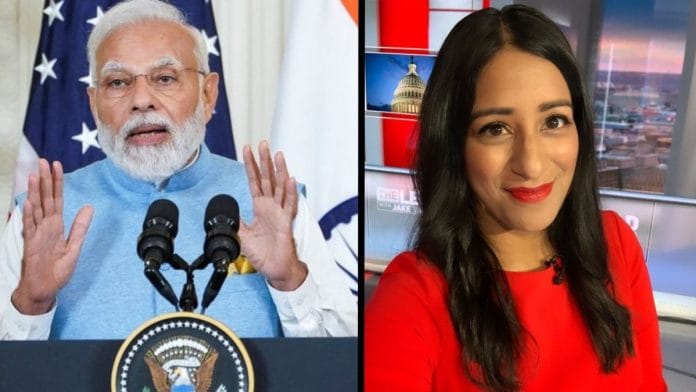New Delhi: The White House has deplored online harassment of a Wall Street Journal reporter who asked Prime Minister Narendra Modi about the rights of minorities in India at a press conference last week.
“We’re aware of the reports of that harassment. It’s unacceptable. And we absolutely condemn any harassment of journalists anywhere under any circumstances. That’s just — that’s completely unacceptable. And it’s antithetical to the very principles of democracy that — you’re right — were on display last week during the state visit,” National Security Council spokesman John Kirby said Monday of the online vitriol targeting the paper’s White House correspondent Sabrina Siddiqui.
After Kirby’s statement, White House Press Secretary Karine Jean-Pierre took the mic to say: “I just want to reiterate a little bit what John said — we’re certainly here at the White House under this administration, we are committed to freedom of the Press, which is why we had the press conference last week. So just want to remind folks, that’s why we had the press conference last week. Also, we certainly condemn any efforts of intimidation or harassment of any journalist that is just trying to do their job.”
At the press meet after Modi’s bilateral talks with US President Joe Biden last Thursday, Siddiqui had asked; “Mr Prime Minister, India has long prided itself as the world’s largest democracy. But there are many there are many human rights groups who say your government has discriminated against religious minorities and sought to silence its critics… What steps are you and your government willing to take to improve the rights of Muslims and other minorities in your country and uphold free speech?”
The Prime Minister replied that he was “surprised” by the question. “In India’s democratic values, there is absolutely no discrimination, neither on the basis of caste, creed, or age or any kind of geographic location,” Modi said through a translator in response to Siddiqui.
“Indeed, India is a democracy. And as President Biden also mentioned, India and America both countries, democracy is in our DNA. Democracy is our spirit. Democracy runs in our veins. We live democracy,” he added.
Thursday’s press meet was the first time in his nine years in office that Modi has taken questions from reporters.
The South Asian Journalists Association also came out in support of Siddiqui, tweeting: “We want to express our continued support of our colleague @SabrinaSiddiqui who, like many South Asian and female journalists, is experiencing harassment for simply doing her job. Press freedom is the hallmark of any democracy and PM Modi leads the world’s largest democracy.”
Following the attack on social media for her question to Modi, Siddiqui put out a tweet with two photos, one with her father watching India win the 2011 cricket World Cup, and another just of her. In both photos, she is seen wearing the Team India cricket jersey.
She captioned it: “Since some have chosen to make a point of my personal background, it feels only right to provide a fuller picture. Sometimes identities are more complex than they seem.”
Since some have chosen to make a point of my personal background, it feels only right to provide a fuller picture. Sometimes identities are more complex than they seem. pic.twitter.com/Huxbmm57q8
— Sabrina Siddiqui (@SabrinaSiddiqui) June 24, 2023
Siddiqui’s father was born in India but raised in Pakistan, while her mother is a Pakistani.
The first attack against Siddiqui came from head of the BJP’s information cell Amit Malviya. He tweeted that Siddiqui’s question was “motivated” and that she was given a “fitting answer” by Modi which, according to him, was a “blow” to the “toolkit gang” – a derogatory phrase used to refer to those who have questioned the BJP and Modi on different issues, including discrimination against Muslims.
Also read: Russia considering US request to meet WSJ journalist Evan Gershkovich, says Interfax






